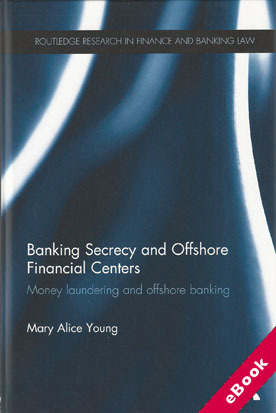
The device(s) you use to access the eBook content must be authorized with an Adobe ID before you download the product otherwise it will fail to register correctly.
For further information see https://www.wildy.com/ebook-formats
Once the order is confirmed an automated e-mail will be sent to you to allow you to download the eBook.
All eBooks are supplied firm sale and cannot be returned. If you believe there is a fault with your eBook then contact us on ebooks@wildy.com and we will help in resolving the issue. This does not affect your statutory rights.
Originally implemented as a necessary tool in the struggle against the drug trade, confiscation has been generally extended to all serious crimes at a global level, but the effectiveness of confiscation in tackling organised crime is undermined by offshore financial centres with strong banking confidentiality laws.
Undoubtedly, a main attraction of offshore financial centres is the duty of banks to observe confidentiality. As well as acting as a safe haven for legitimate funds, offshore financial centres also harbour illicit assets; organised criminals will take advantage of strong confidentiality laws to prevent the creation of a paper trail which can be followed by investigators.
Thus, confiscation efforts to tackle organised crime are eroded as long as criminals can access their funds in offshore financial centres.
This book brings together the issues surrounding banking secrecy and confiscation of criminal proceeds. The book examines the existing legal agreements at the international, regional and national levels and their interaction in the substantive areas of confiscation, anti-money laundering and banking confidentiality laws.
It looks at how these agreements have been applied in offshore financial centres and demonstrates that despite a number of legally binding UN Conventions as well as global anti-money laundering recommendations, the implementation of them is often lukewarm by those Parties who have ratified the Convention and adopted obligations, because of is the confiscation legislation is incompatible with strict banking confidentiality laws.
The work draws on the insights of criminologists to offer critical insight into the legislative frameworks designed to deal with banking secrecy and confiscation in offshore financial centres. It goes on to offer suggestions for measures that may be taken by major economies to circumvent the lack of cooperation by offshore financial centres as intolerance towards money laundering grows in light of recent political and economic events.